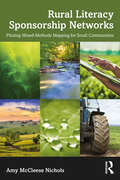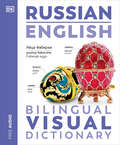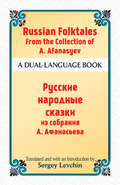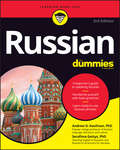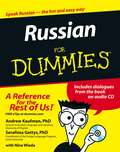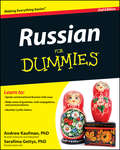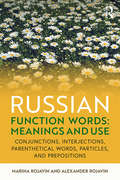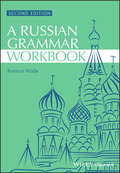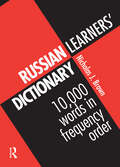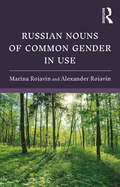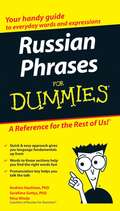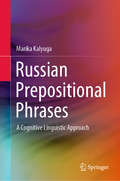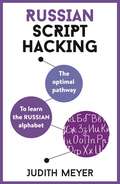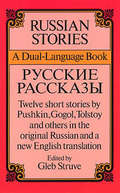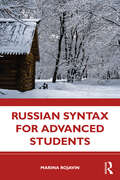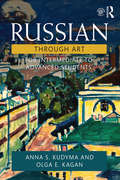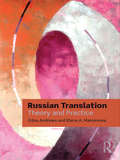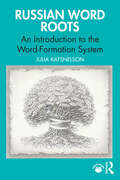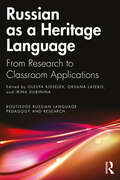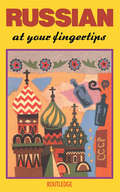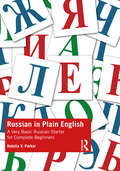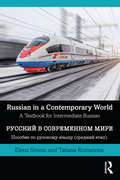- Table View
- List View
Rural Literacy Sponsorship Networks: Piloting Mixed-Methods Mapping for Small Communities
by Amy McCleese NicholsThis text provides an in-depth exploration of rural community literacy, examining the ways in which community-building, social networks, time, race, and politics interplay.Mapping the dense literacy sponsorship network of a small rural town in the southeastern United States, Nichols offers a window into the challenges and successes of collective literacy sponsorship. Through an original mapping-focused approach, the book explores multiple social and environmental layers that construct literacy sponsorship writ large.This approach provides a novel methodological entry to rural literacies and will be key reading for rural community literacy advocates, literacy scholars, graduate students, and researchers.
Russian - English Bilingual Visual Dictionary (DK Bilingual Visual Dictionaries)
by DKLearn more than 6,000 useful words and phrases in Russian with this engaging illustrated dictionary.The Russian English Bilingual Visual Dictionary is your essential companion to learning Russian - from the million-copy bestselling Bilingual Visual Dictionary series. This handy pocket-size guide has over 6,750 fully illustrated words and phrases in Russian and English, along with a free bilingual audio app. Learn all the words and phrases you need to buy food and clothes, talk about work and education, visit the doctor, go to the bank, use public transport, and much more.This Russian-English visual dictionary includes:A fully illustrated bilingual guide for adults.Updated and revised content with new images and vocabulary.A fully updated audio app that allows you to hear all words in both languages.A new edition from the global bestselling Bilingual Visual Dictionary series.Perfect for students, tourists, and business travelers, the dictionary is incredibly easy to follow, with thematically organized vocabulary so you can find closely related words on a particular topic.Words and phrases are illustrated with full-color photographs and artworks, helping to fix new vocabulary in your mind. The supporting audio app enables you to hear all the words and phrases spoken out loud in both languages to help you learn, remember, and pronounce important vocabulary.
Russian Bible Wars
by Stephen K. BataldenAlthough biblical texts were known in Church Slavonic as early as the ninth century, translation of the Bible into Russian came about only in the nineteenth century. Modern scriptural translation generated major religious and cultural conflict within the Russian Orthodox church. The resulting divisions left church authority particularly vulnerable to political pressures exerted upon it in the twentieth century. Russian Bible Wars illuminates the fundamental issues of authority that have divided modern Russian religious culture. Set within the theoretical debate over secularization, the volume clarifies why the Russian Bible was issued relatively late and amidst great controversy. Stephen Batalden's study traces the development of biblical translation into Russian and of the 'Bible wars' that then occurred in the nineteenth and twentieth centuries in Russia. The annotated bibliography of the Russian Bible identifies the different editions and their publication history.
Russian Folktales from the Collection of A. Afanasyev: A Dual-Language Book (Dover Dual Language Russian)
by Sergey Levchin Alexander AfanasyevThis original dual-language edition features new translations of Russian folk tales from the authoritative three-volume collection by famed author Alexander Afanasyev. A rich, robust world of the imagination that will captivate readers of all ages, this compilation's tales include The Princess-Frog, The Tale of Prince Ivan, The Firebird and the Gray Wolf, and many others.
Russian For Dummies
by Andrew D. Kaufman Serafima GettysPrivyet! Explore the Russian language with this fantastic beginner's guide With over 260 million speakers around the world, Russian remains one of the most popular and marketable languages you can learn. And for those who have no idea where to begin, Russian For Dummies is the perfect first step! In this easy-to-understand resource for Russian language beginners, you'll discover basic grammar and common expressions you might use while shopping, dining out, traveling, or conducting business. You'll also find simplified and generalized conjugation rules and a streamlined approach to grammar based on how you actually understand the language, rather than technical rules and details. This book offers: Supplemental online resources so you can hear how native Russian speakers use the words you're trying to learn Guidance on identifying Cyrillic letters from the alphabet used by Russian speakers and writers Tons of useful exercise and practice opportunities you can take advantage of to sharpen your skills Perfect for any newcomer to the Russian language trying to pick up their first few phrases, Russian For Dummies is a fantastic first foray into conversational Russian that will have you ordering meals, going shopping, and navigating other day-to-day situations with ease. Удачи! (That means good luck!)
Russian For Dummies
by Andrew Kaufman Serafima Gettys Nina WiedaRussian is spoken by nearly 450 million people, and demand for Russian-speakers is growing. This introductory course includes an audio CD with practice dialogues-just the ticket for readers who need basic Russian for business, school, or travel. Serafima Gettys, PhD (Newark, CA), is Coordinator of the Foreign Language Program at Lewis University. Andrew Kaufman, PhD (Charlottesville, VA), is a Visiting Assistant Professor at the University of Virginia. Note: CD-ROM/DVD and other supplementary materials are not included as part of eBook file.
Russian For Dummies, 2nd Edition
by Andrew Kaufman Serafima GettysThe fast and easy way to learn to speak Russian With Russia in line to host the World Cup in 2018, the Winter Olympics in 2014, as well as a Formula 1 Grand Prix, interest in Russia is on the rise. Russian For Dummies is an excellent resource for students, tourists, and businesspeople looking for an introduction to this popular and complex language. This updated edition offers new and improved content, more useful exercises and practice opportunities, all new content devoted to the Cyrillic alphabet, and much more. A revamped, user-friendly organization A fully updated and expanded audio CD with real-life conversations by native speakers Expanded coverage of grammar, verb conjugations, and pronunciations A refreshed and expanded mini-dictionary complete with even more essential vocabulary Russian For Dummies provides basic instruction to those seeking to grasp the basics of conversational Russian. Students, travelers, and businesspeople with little or no language experience will gain a clearer understanding on how to communicate in Russian.
Russian Function Words: Conjunctions, Interjections, Parenthetical Words, Particles, and Prepositions
by Marina Rojavin Alexander RojavinRussian Function Words: Meanings and Use is a collection of 463 prepositions, conjunctions, particles, interjections, and parenthetical words. This book provides a semantic, syntactic, and stylistic analysis of each word, accompanying the explanation with examples of the word’s usage in discourse in contemporary, everyday Russian and analogous translations into English. Consequently, it allows users to develop an understanding of contemporary grammatical, lexical, and stylistic norms, with the aim of mastering these critical words. This book also includes a multitude of idioms and sayings that users will learn to use in the appropriate context. Intermediate and advanced students, instructors, and translators will find this a useful supplement to their existing resources. It also serves as a helpful reference for independent learners at all levels.
Russian Grammar Workbook (Blackwell Reference Grammars #8)
by David Gillespie Terence WadeThe second edition of A Russian Grammar Workbook provides a rigorous and hands-on approach to Russian grammar for students who are intent on mastering the nuance and complexities of this language. Revised and updated version of the popular and comprehensive workbook offering detailed coverage of all aspects of Russian grammar New edition reflects changes in Russian lexis and grammar over the past few years Features over 230 sets of structured exercises Packed with activities ranging from substitution drills and multiple choice questions, to grammatical quizzes and translation exercises May be used independently or in conjunction with Wade’s A Comprehensive Russian Grammar, 3rd edition; a transparent structure links directly to the Grammar for ease of reference between the two volumes
Russian Learners' Dictionary: 10,000 Russian Words in Frequency Order
by Nicholas BrownThis dictionary contains 10,000 Russian words in order of importance starting with the most common and finishing with words that occur about 8 times in a million. All the words have English translations, many have examples of usage and the entries include information on stress and grammatical irregularities. There is also a complete alphabetical index to the words in the list.A learner who knows all or most of these 10,000 words can be regarded as competent in Russian for all normal purposes. The list takes you from a beginner's core vocabulary through to postgraduate level.
Russian Learners' Dictionary: 10,000 Russian Words in Frequency Order
by Nicholas BrownThis dictionary contains 10,000 Russian words in order of importance starting with the most common and finishing with words that occur about 8 times in a million. All the words have English translations, many have examples of usage and the entries include information on stress and grammatical irregularities. There is also a complete alphabetical index to the words in the list.A learner who knows all or most of these 10,000 words can be regarded as competent in Russian for all normal purposes. The list takes you from a beginner's core vocabulary through to postgraduate level.
Russian Nouns of Common Gender in Use
by Marina Rojavin Alexander RojavinRussian Nouns of Common Gender in Use is a unique collection of more than 150 nouns that mainly have grammatical features of the feminine gender, but refer to both male and female persons. This book provides the meanings of the words and explains their use in discourse with the help of examples from literature, media, and everyday speech. Each entry includes parallel English translations, which are analogous and appropriate to the given context. These enable the reader to easily grasp each word’s organic place and purpose in a particular sentence or situation. This book will serve as a valuable tool for students and instructors, translators, scholars, and anyone interested in learning the Russian language.
Russian Phrases For Dummies
by Andrew Kaufman Serafima Gettys Nina WiedaTraveling in a foreign country such as Russia suddenly becomes a lot more exciting when you can engage in elegant small talk with the locals. Russian Phrases For Dummies is your handy guide to everyday words and phrases you can start using immediately to make your visit more rewarding and a whole lot easier. This user-friendly phrasebook will jump-start your comprehension and have you speaking basic Russian in no time. Its quick-and-easy approach gives you language fundamentals up front, the Words to Know section helps you find the right word fast, and the easy-to-use pronunciation key helps other people understand what you're trying to say. You'll learn how to: Get directions, shop, and eat out Talk numbers, dates, and time Chat about family and work Discuss sports and the weather Deal with problems and emergencies Pronounce familiar English words and phrases in Russian and English Beware of words that sound to English but don't mean the same thing Read signs that use the Russian alphabet Follow the conventions of Russian pronunciation Use basic Russian grammar correctly Keep ten commonly used Russian phrases on the tip of your tongue Use basic telephone vocabulary and send letters, emails, and faxes Don't have time to study the language before you get to Russia? No worries. Just flip through Russian Phrases For Dummies, find the section that fits your needs, and start talking!
Russian Prepositional Phrases: A Cognitive Linguistic Approach
by Marika KalyugaThe book presents a comprehensive study of Russian prepositions, with a focus on expressing spatial characteristics. It primarily deals with how metaphorical and metonymical transfers motivate the use of Russian prepositional phrases, explaining the collocations of prepositional phrases with verbs as a realisation of a conceptual metaphor or a metonymy. The author confronts a problem that is attracting growing attention within present-day linguistics: the semantics of prepositions and cases. The book seeks to clarify the conceptual motivations for the use of the combinations of Russian primary prepositional phrases, as well as to demonstrate how their spatial meanings are extended into non-spatial domains. This book incorporates an analysis of a large number of items, including 30 combinations of primary prepositions with cases. An original contribution, the book is of interest to teachers and students studying Slavic languages, and to cognitive linguists.
Russian Script Hacking: The optimal pathway to learn the Russian alphabet
by Judith MeyerUsing a unique, tried and tested algorithm, this book teaches you how to quickly and efficiently recognise letters and common words in Russian script. Whether you're travelling and want to understand the words around you, or preparing to learn Russian and want to master the basics, this is the book for you. In this book you will find: · An introduction to Russian script· Plenty of practice activities to help you recognise each letter of the alphabet · Helpful mnemonics to make you remember the shape of each letter· Accompanying audio files so you know how to pronounce letters and words · Handy tips to help you decipher common and familiar words The audio for this course can be downloaded from the Teach Yourself Library app or streamed at library.teachyourself.com.Rely on Teach Yourself, trusted by language learners for over 75 years.
Russian Script Hacking: The optimal pathway to learn the Russian alphabet
by Judith MeyerUsing a unique, tried and tested algorithm, this book teaches you how to quickly and efficiently recognise letters and common words in Russian script. Whether you're travelling and want to understand the words around you, or preparing to learn Russian and want to master the basics, this is the book for you. In this book you will find: · An introduction to Russian script· Plenty of practice activities to help you recognise each letter of the alphabet · Helpful mnemonics to make you remember the shape of each letter· Accompanying audio files so you know how to pronounce letters and words · Handy tips to help you decipher common and familiar words The audio for this course can be downloaded from the Teach Yourself Library app or streamed at library.teachyourself.com.Rely on Teach Yourself, trusted by language learners for over 75 years.
Russian Stories: A Dual-Language Book (Dover Dual Language Russian)
by Gleb StruveThe story, or novella, as a literary genre has a much shorter history in Russia than in some Western countries, but it has nevertheless produced important works by some of the greatest names in Russian literature. This dual-language volume contains 12 such stories — memorable tales by Tolstoy, Dostoevsky, Pushkin, Chekhov, Gogol, Turgenev, Bunin, and other masters. Each selection is presented here in the original Russian with an excellent literal English translation on the facing pages.Also included are linguistic and cultural notes, a Russian-English vocabulary, study questions and more. In addition, Professor Struve has supplied an enlightening introduction to the Russian short story, as well as concise biographical/critical introductions to each selection. An especially helpful feature for students of Russian is the presence of stress accents in the Russian text, a feature usually found only in primers.
Russian Syntax for Advanced Students
by Marina RojavinRussian Syntax for Advanced Students is a textbook which illuminates relationships between words, phrases, clauses, and sentences. Using this book, students will acquire conscious knowledge of how words function in various syntactical constructions as applied to discourse, such as specific verbal situations, based not only on the underlying linguistic phenomena, but also on the content of sociolinguistic situations. The book helps develop communicative skills for advanced mastery and constantly emphasizes the importance of accuracy in the use of syntactic structures. Russian Syntax is designed primarily as a textbook for classroom use for intermediate-high and advanced-level students. The text is also suitable for independent study by graduate students in linguistics or pedagogy, as well as being a valuable reference for instructors.
Russian Through Art: For Intermediate to Advanced Students
by Olga E. Kagan Anna S. KudymaRussian Through Art: For Intermediate to Advanced Students develops all four language skills while enhancing students’ cultural knowledge through exposure to Russian visual arts. Each of the six thematically organised chapters is accompanied by online resources, available at https://ccle.ucla.edu/course/view/russnart. These supporting materials include online lectures, readings, audio and video clips and assignments of varying levels of difficulty, starting with description and narration tasks and progressing to discussion and debate. Each chapter contains a number of task-based and project-based assignments. The book and website’s modular design make it easy to adapt this comprehensive resource to different course needs and different levels. By the end of the course students will have broadened their active vocabulary, enhanced their grammatical skills while familiarising themselves with Russian art in its various representations and periods.
Russian Translation: Theory and Practice
by Edna Andrews Elena MaksimovaRussian Translation: Theory and Practice is a comprehensive practical course in translation for advanced undergraduate and postgraduate students of Russian. The course aims to provide intensive exposure with a view to mastering translation from Russian into English while carefully analyzing the specific problems that arise in the translation process. Offering over 75 practical translation exercises and texts analyzed in detail to illustrate the stage-by-stage presentation of the method, Russian Translation addresses translation issues such as cultural differences, genre and translation goals. The book features material taken from a wide range of sources, including: journalistic medical scholarly legal economic popular culture – literature (prose and poetry), media, internet, humour, music. Central grammatical and lexical topics that will be addressed across the volume through the source texts and target texts include: declensional and agreement gender; case usage; impersonal constructions; verbal aspect; verbal government; word order; Russian word formation, especially prefixation and suffixation; collocations and proverbs; and abbreviations. Russian Translation: Theory and Practice is essential reading for all students seriously interested in improving their translation skills. A Tutor’s Handbook for this course, giving guidance on teaching methods and assessment, as well as specimen answers, is available in PDF format from our website at http://www.routledge.com/books/Russian-Translation-isbn9780415473477. Edna Andrews is Professor of Linguistics and Cultural Anthropology, Director of the Center for Slavic, Eurasian and East European Studies at Duke University, USA. Elena Maksimova is Associate Professor of the Practice in the Department of Slavic and Eurasian Studies at Duke University, USA.
Russian Word Roots: An Introduction to the Word-Formation System
by Julia KatsnelsonRussian Word Roots provides a systemic approach to Russian vocabulary acquisition, focusing on the most productive Russian word roots and their formation system to allow students to master both active and passive vocabulary more quickly.Each of the 17 chapters focuses on a specific word root and includes a list of vocabulary based on the root, along with various tasks designed to review the acquired vocabulary that will solidify students’ grasp of word formation. With this textbook, students will learn approximately 300 new words and improve their ability to deduce the meanings of new words through common roots. They will also gain a deeper understanding of the meanings of prefixes and suffixes, enhancing their ability to communicate more precisely. This textbook will not only strengthen the students’ Russian language but also sharpen linguistic skills in their native language by cultivating an awareness of semantic similarities across languages.Russian Word Roots is ideal for students with a Novice High to Intermediate Low proficiency level in Russian and an existing understanding of basic grammar concepts, including verb conjugation, cases, and word-formation patterns.
Russian as a Heritage Language: From Research to Classroom Applications (Routledge Russian Language Pedagogy and Research)
by Svetlana V. Nuss Olesya Kisselev Oksana Laleko Irina DubininaRussian as a Heritage Language: From Research to Classroom Applications brings together linguistically and pedagogically oriented research traditions in a comprehensive review of current Russian heritage language (HL) studies.Divided into three parts, the collection offers a variety of frameworks and approaches spanning research on HL speakers’ linguistic and pragmatic competence, literacy development, and sociocultural characteristics of Russian in diaspora. Presenting a wide range of new empirical findings, the volume explores topics at the forefront of HL studies, from assessment of HL learners’ linguistic competence and language attitudes to research on communities and institutional affordances impacting HL acquisition and maintenance. Each chapter connects current research with specific classroom applications, presenting Russian as a global language in various sociopolitical and majority-language contexts.Combining methodological rigor with theoretical insights across diverse areas of language study, Russian as a Heritage Language advances the field of HL pedagogy and serves as essential reading for HL educators and researchers as well as for linguists studying bilingualism.
Russian at your Fingertips (The Fingertips Series)
by LexusFirst published in 1990. Routledge is an imprint of Taylor & Francis, an informa company.
Russian in Plain English: A Very Basic Russian Starter for Complete Beginners
by Natalia V. ParkerRussian in Plain English enables complete beginners to acquire the skill of reading words written in Cyrillic independently, with no English transcription or imitated pronunciation, within a short period of time. This book introduces the Cyrillic alphabet gradually, feeding in the letters and their various pronunciation aspects one by one over its ten units, thus building a complete picture of the Russian sound and writing systems. It also highlights the interrelationship of the two systems and helps learners to see the logic behind the use of the Cyrillic alphabet. In addition, the book teaches learners to produce Russian word stress on a marked syllable, contributing to stress acquisition. Furthermore, the book explains the basic grammatical features of Russian words and the rules of how to put them into sentences, enabling learners to start saying things in Russian from Unit 1. It employs some findings of research in language processing, helping learners to start building their speaking and reading skills. This book is an essential guide for all beginners, including students and independent learners.
Russian in a Contemporary World: A Textbook for Intermediate Russian
by Elena Simms Tatiana RomanovaRussian in a Contemporary World is an intermediate textbook with a focus on improving oral and written skills of the Russian language by encouraging students’ creative potential with their use of language in a contemporary society, such as media, TV, art, and technology. Key features of the textbook include: Use of original texts and application of material by choosing topics which reflect the students’ general interests, according to a survey conducted among Humanities undergraduates and which are essential for students of Russian language, culture, and society; Practical skills: the textbook allows students to process primary text sources, summarising, writing, and expressing their views on certain sociopolitical issues; Raises issues which are being widely discussed in present-day Russia and introduces trends in the development of modern Russian society; Providing feedback: students can check their work against answer keys that feature in a number of exercises as well as find discussions on different grammatical topics in the Appendix. Aimed at B1-B2 and Intermediate-Mid students of Russian, this is the ideal textbook for those aiming to improve their Russian whilst gaining knowledge of contemporary Russian culture and society. With answer keys and grammar topics included, the textbook is also ideal for independent study.
